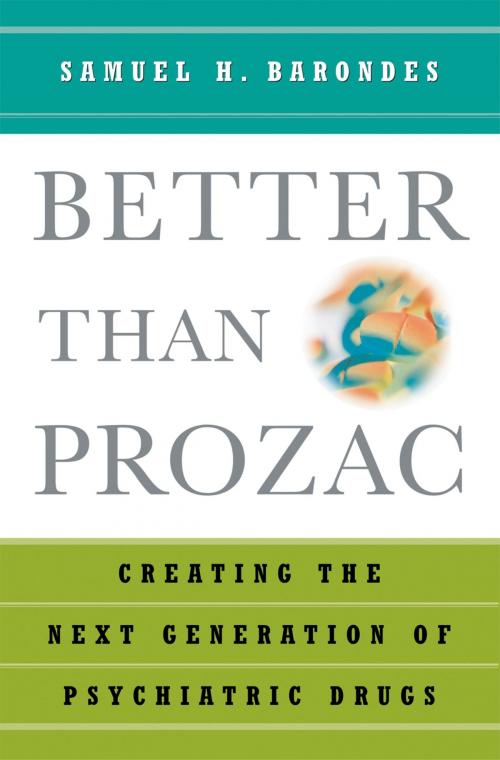Better than Prozac
Creating the Next Generation of Psychiatric Drugs
Nonfiction, Health & Well Being, Psychology, Psychiatry, Medical, Specialties, Internal Medicine, Neuroscience, Reference, History| Author: | Samuel H. Barondes | ISBN: | 9780190288006 |
| Publisher: | Oxford University Press | Publication: | June 16, 2003 |
| Imprint: | Oxford University Press | Language: | English |
| Author: | Samuel H. Barondes |
| ISBN: | 9780190288006 |
| Publisher: | Oxford University Press |
| Publication: | June 16, 2003 |
| Imprint: | Oxford University Press |
| Language: | English |
Every day millions of people take psychiatric drugs. In Better Than Prozac Samuel Barondes considers the benefits and limitations of Prozac, Ritalin, Valium, Risperdal, and other widely used medications and the ways that superior ones are being created. In tracing the early history of these drugs Barondes describes the accidental observations that led to their discovery and their great impact on our view of mental illness. He goes on to show how their unexpected therapeutic effects were attributed to their influence on neurotransmitters that carry signals in the brain and how this guided their improvement. But Barondes reminds us that, like the originals, current psychiatric drugs don't always work, and often have negative side effects. Furthermore, none were crafted as remedies for known brain abnormalities. In contrast, the design of the drugs of the future will be based on a different approach: an understanding of the molecular mechanisms that give rise to specific patterns of mental symptoms. Using colorful examples of contemporary research, he shows how it is gradually leading to a new generation of psychiatric medications. A lucid evaluation of psychopharmacology, Better Than Prozac offers a deep understanding of psychiatric drugs for people who take them, those who are considering them, and those who are just fascinated by the powerful effects of these simple chemicals on our thoughts and our feelings.
Every day millions of people take psychiatric drugs. In Better Than Prozac Samuel Barondes considers the benefits and limitations of Prozac, Ritalin, Valium, Risperdal, and other widely used medications and the ways that superior ones are being created. In tracing the early history of these drugs Barondes describes the accidental observations that led to their discovery and their great impact on our view of mental illness. He goes on to show how their unexpected therapeutic effects were attributed to their influence on neurotransmitters that carry signals in the brain and how this guided their improvement. But Barondes reminds us that, like the originals, current psychiatric drugs don't always work, and often have negative side effects. Furthermore, none were crafted as remedies for known brain abnormalities. In contrast, the design of the drugs of the future will be based on a different approach: an understanding of the molecular mechanisms that give rise to specific patterns of mental symptoms. Using colorful examples of contemporary research, he shows how it is gradually leading to a new generation of psychiatric medications. A lucid evaluation of psychopharmacology, Better Than Prozac offers a deep understanding of psychiatric drugs for people who take them, those who are considering them, and those who are just fascinated by the powerful effects of these simple chemicals on our thoughts and our feelings.















